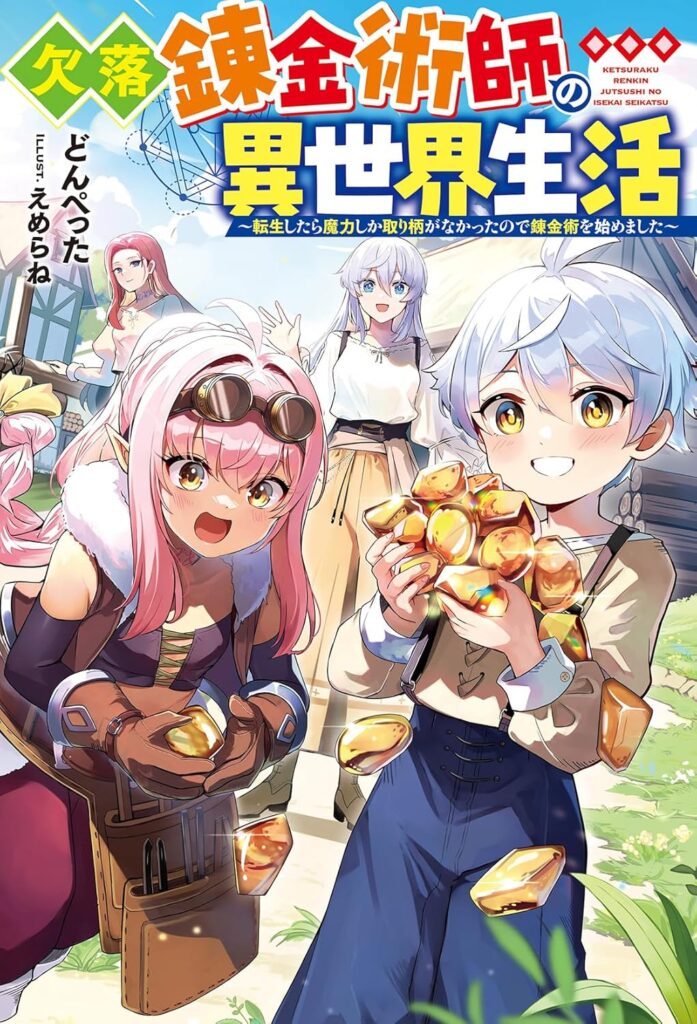
Kays Translations
Just another Isekai Lover~
Chapter 17: Upgrading the Goggles
―[Meluestat, Baron Merlot’s Estate – Pavilion, SIDE: Arthur]―
Mother had said she needed to speak with Tunis-san, so we returned to the pavilion in the garden.
“Do you… understand Rugena?”
“…No, I don’t.”
“I see.”
“Arthur-sama, is something the matter?”
“Not exactly. I just wanted to check whether the guards assigned by the guild are still keeping watch, but I can’t see around me from here.”
We had gone out of our way to return to this very spot just to confirm whether they were still monitoring us.
The pavilion doubled as a waiting area for visitors. Though it was close to the gate, the estate grounds were surrounded by walls, cutting off any view of the outside. The only glimpse beyond was through the iron-barred gate.
I wondered if Rugena might sense something like, “A presence!?” or “Eyes watching!?”—so I asked, but it seemed that even she couldn’t.
Of course, expecting that from me would be impossible too.
“Do we need to go outside and check?”
“No need. Even if they’re not there, we’ll treat it as though they are.”
If they were easy to scare off, I doubt they would have bothered intimidating us at all. But since nobles were involved, they couldn’t risk forcing their hand. For now, all they could do was watch. Neither side knew the other’s intentions, so for the time being, it was a standoff.
After a while, we talked about future plans. Since both of them were former adventurers, they promised to gather materials once we returned to the village.
“Arthur-sama, your meal is ready. Please move to the dining room.”
“Understood.”
Since it wasn’t the main dining hall, I wondered if we’d be eating separately from the baron’s family.
―[Meluestat, Baron Merlot’s Estate – Guest Room]―
A maid led me inside, where Mother was already waiting.
“Mother, are you done with your discussion?”
“Yes. The finer details will be decided after inspecting the workshop, but the main points have been settled.”
“Is there anything I can do?”
“Let’s see… What I’m about to tell you isn’t a secret, but it’s not for spreading around either. Keep that in mind as you listen.”
She then told me about a village that had been completely destroyed.
The village had been intended as a key point for a road through the forest, but it was overrun by a horde of demon beasts and utterly annihilated. Mother explained that this was part of why the baronial finances had grown strained. The urgency behind her sharing this story was to get the glassworks operational as quickly as possible.
“The workshop equipment will be left to Rugena.”
“Yes. Leave it to me.”
Rugena would inspect and repair the furnace, a task that would also help her regain her instinct for smithing after some time away.
“Now, let’s eat. From now on, you should join us at the table too.”
“Tine-sama?!”
“Of course, only when it’s the family. There’s no point in separating meals for just the four of us. Meals are for the household—family—so you, as guards, must eat properly… well, that’s about it.”
Mother stammered through her explanation, but ended with a blush.
“Yes, Tine-sama.”
“Yes. Also, it would be nice to have some alcohol.”
Rugena, taking advantage of Mother’s words, asked for alcohol—but unfortunately, the decision wasn’t hers to make. It was mine.
So, her request was denied.
Dining with nobles came with all sorts of cumbersome etiquette, but at the family table, we didn’t need to worry so much. Mother didn’t get angry if someone spoke with food in their mouth, for instance.
After finishing our meal, I decided to work on improving the goggles and glasses. It was the first time I’d created something while being watched by everyone, so I felt a bit nervous.
“Rugena, let’s start by fixing the goggles.”
“Yes.”
I took the goggles from Rugena and began considering the steps for improvement.
“…The slime cores are magical stones, right?”
“Yes. But unlike normal magical stones, they’re not hard like rock. That’s why we call them cores instead of simply ‘magic stones.’”
The surface was a soft membrane, and inside was a gel-like magical stone. Its interior had the property of absorbing impact.
I checked the core sheet used in Rugena’s gear—the material was relatively hard, about the firmness of a tennis ball. This was fine for armor, which benefited from impact absorption.
But goggles needed to fit snugly against the face, with a soft yet secure cushion that wouldn’t slip. Ideally, it would resemble foam rubber in texture.
“Rugena, what’s the ratio of core material to hardening agent?”
“Earlier, it was ten grams of core material to three grams of hardener.”
I wanted the material softer than the previous core sheet, so I would try a ratio of ten to two, aiming for a foam-like, perforated texture.
First, I materialized a measuring cup and a bowl, along with a whisk for mixing and a shallow five-centimeter tray for hardening. I measured the core and hardener, placed them in the bowl, and then began mixing in the materialized wheat grains.
“Arthur-sama, why are we adding wheat?”
“Hm? …Well, you’ll see soon enough.”
Rugena looked disappointed, but it was faster to show her than explain. Not that I was just being lazy—it really was better seen than told.
I poured the mixed core material into a shallow tray and waited for it to set.
After about five minutes, it seemed firm enough, so I carefully dissolved the materialization and inspected the finished core.
“…It’s a failure.”
“It’s too soft,” Rugena commented.
The idea had been to mix grains of wheat, materialized, into the core material before hardening it. Then, after it solidified, dissolving the materialization would leave hollow spaces in the core. The procedure itself had been correct—but the voids had turned out far too large, leaving the material practically hollow.
“The wheat grains were too big,” I muttered to myself.
This time, I decided to try again, using sesame seeds instead of wheat, much smaller in size.
“…Hmm, this firmness might be about right?” I asked, pressing lightly.
“Isn’t it still a bit soft?” Rugena questioned.
“It only needs to sink halfway when I press it with my finger. If it’s too hard, it’ll rub and turn red,” I explained.
Satisfied with the texture, I moved on to making the core material for the goggles.
I materialized a container shaped to fit the goggles. Then I mixed the core material with the hardening agent and the sesame seeds I had materialized, poured it into the container, and waited for it to solidify.
“Materialization is really convenient,” Rugena said, her voice tinged with awe.
“Yeah,” I replied. “You can create containers or tools exactly as you imagine them, right on the spot. That’s very handy.”
Alchemy is useful, of course, but materialization has the unique advantage of instantly creating exactly what you need. Its drawback is that it consumes more magical energy than conventional alchemy.
“Could I learn that too?” Rugena asked.
“It requires a lot of magical energy and precise control. How about you, Rugena?”
“…Dwarves don’t have much magic. —Too bad,” she said with a sigh.
“Well, it can’t be helped. Besides, it’s not an ability you strictly need if you have the right tools,” I said.
“But there’s no need to clean up afterward,” she pointed out.
“Ha, that’s true.”
Since the material disappears once the materialization is dissolved, there’s no cleanup necessary. While Rud—the one who draws transmutation circles—is the most indispensable, materialization allows us to make practical items like measuring cups, spoons, bowls, and spatulas with exact dimensions and volumes. The precision is a huge help.
“Looks like it’s ready,” I said.
The final piece measured 1 cm wide and 3 cm thick, with a slight concave dip where it touched the nose, ensuring it wouldn’t press uncomfortably. Pressed lightly, a finger sank in about halfway, just the way I wanted.
“Good. Excellent work. From now on, we’ll call this hollowed core material a ‘Foam Core,’” I declared.
“Foam Core? But there’s no actual foam involved,” Rugena said, perplexed.
I paused for a moment.
“Well, it’s just for the vibe,” I replied with a shrug.
“Arthur-sama is… quite casual,” she muttered under her breath.
I ignored her cheeky remark and continued the work. I removed the leather previously attached to the frame and replaced it with the Foam Core, completing the goggles.
“How does it feel?” I asked.
“Well, it doesn’t shift around like it did with the leather,” Rugena said.
“Good. Then we’ll continue using the goggles for testing,” I said.
“Yes, Arthur-sama,” she replied.
Visually, everything seemed fine, but practical use could reveal hidden flaws. We would continue testing for a while.
“I’ll borrow the glasses for a little modification,” I said.
“A modification?” Rugena asked.
“Just a minor one,” I assured her.
The frames of the glasses were made of silver to prevent allergic reactions that iron might cause, and perhaps to avoid corrosion, coating could be necessary. Initially, I had only shaped them into glasses. This time, I remade them with alchemy, adding hinges so they could fold, and replaced the leather pads with firmer core sheets.
I considered changing their shape entirely, but after looking at them, I decided they were cute just as they were.
Finally, I made a case for the glasses.
It would be wooden, but I added a twist—using alchemy, I compressed the wood to increase its strength.
First, I applied pressure with alchemy to compress the wood.
Then, using cutting techniques, I crafted four long panels, each 3 mm thick and 20 cm by 7 cm. On two of these, I carved grooves for sliding the lid. I also made two side panels, 3 cm by 7 cm and 3 cm by 6.7 cm.
With the parts ready, I assembled them like a rectangular pencil box. The lid sat slightly lower and slid along the grooves from the side.
Finally, I lined the interior with a thin core sheet to protect the glasses, completing the case.
“All right, this one’s done too,” I said.
“…Watching Arthur-sama work, I feel like we don’t even need blacksmiths,” Rugena remarked.
“But alchemy can’t make cutting tools,” I reminded her.
“Can’t make them?”
“No. You can shape them, but they won’t cut at all.”
My first realization came while materializing a sickle to weed the fields. It had the correct shape, but couldn’t cut a single blade of grass. Later, out of curiosity, I tried making a knife after the glasses, but it failed in the same way.
The issue seemed to be that shaping alone couldn’t reach the precision required to create a sharp edge.
“Can’t alchemy be used to sharpen it?” Rugena asked.
Sharpen with alchemy… Cutting techniques exist in the diagrams, so you could shape or grind something, but it’s not the same as actual honing on a whetstone.
“…That, we’d have to test. I can’t say for sure yet,” I replied.
